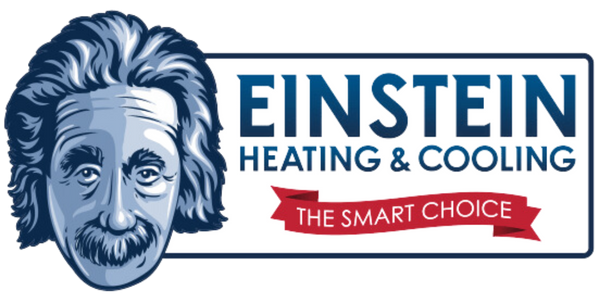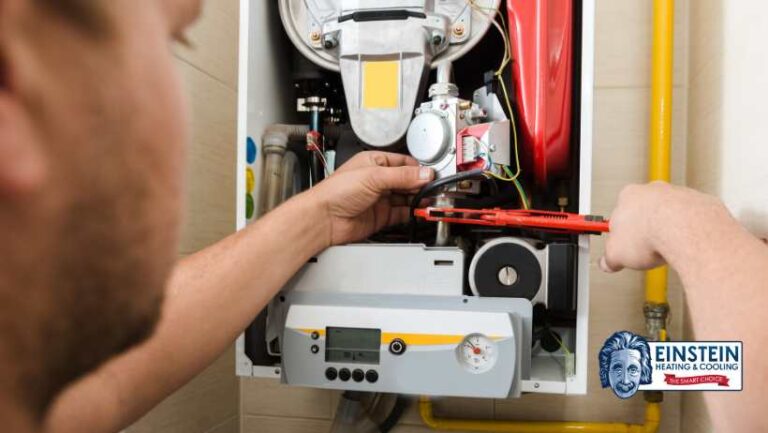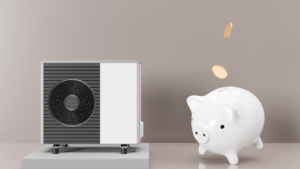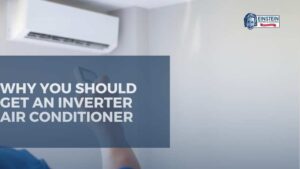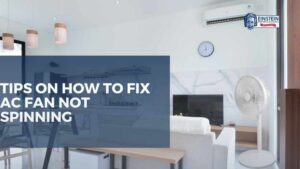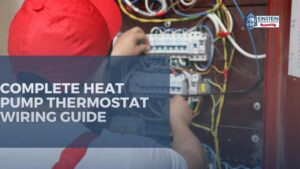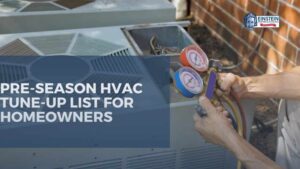If you’re in Bend, Oregon and you’re searching “furnace repair near me” during the harsh cold months, look no further. At Einstein Heating and Cooling, we understand the significance of a well-maintained furnace. The furnace at home plays a crucial role in keeping you warm and comfortable. However, like any other mechanical system, furnaces are not immune to wear and tear. In this blog, we will discuss 12 common furnace problems and how to find a capable and reliable furnace repair near Bend.
Common Furnace Problems
1. Furnace Not Producing Heat
One of the most distressing problems during the winter months in Bend is when your furnace fails to produce heat. Several factors may contribute to this issue:
- Thermostat Misconfiguration: Check if the thermostat is set to the desired temperature. Ensure it’s set to “heat” mode, and the fan is on “auto.”
- Clogged Air Filter: A dirty or clogged air filter can impede airflow, leading to insufficient heat production. Regularly replace or clean your filter to ensure proper operation.
- Gas Supply Issues: If you have a gas furnace, verify that the gas supply is on. A malfunctioning gas valve can also lead to this problem.
- Pilot Light Problems: For gas furnaces, the pilot light should be lit. If it’s out, follow the manufacturer’s instructions to relight it.
2. Insufficient Heating
When your furnace produces heat but doesn’t warm your home adequately, it can be frustrating. Some common causes for insufficient heating include:
- Inadequate Insulation: Poor insulation can result in heat loss. Ensure your home is properly insulated to retain heat efficiently.
- Leaky Ducts: Leaky or poorly insulated ductwork can lead to heat loss. Inspect your ducts for any damage or gaps and seal them if necessary.
- Furnace Size: An incorrectly sized furnace may not be powerful enough to heat your home. Consult with a professional to assess whether your furnace is the right size for your space.
- Dirty or Blocked Air Ducts: Over time, air ducts can accumulate dust and debris, obstructing airflow. Regular duct cleaning can help alleviate this issue.
3. Unusual Furnace Noises
Strange noises emanating from your furnace can be a cause for concern. These noises may include:
- Banging or Clanging Sounds: This could indicate a loose or broken part within the furnace, such as a blower wheel or motor. It’s important to have these issues addressed promptly to prevent further damage.
- Squealing or Whining Sounds: These noises may result from a malfunctioning blower motor or worn-out fan belt. Replacing or lubricating these components can often resolve the problem.
- Rumbling or Booming Noises: This can be a sign of delayed ignition, which may cause gas buildup. Turn off your furnace and contact a professional immediately to investigate and fix the issue.
- Popping or Clicking Sounds: These sounds are usually due to the natural expansion and contraction of the furnace as it heats up and cools down. They are generally harmless.
4. Short Cycling
Short cycling occurs when your furnace repeatedly turns on and off in quick succession, which can reduce its efficiency and lifespan. Common causes of short cycling include:
- Oversized Furnace: An oversized furnace can heat your home too quickly, leading to short cycling. Consult with an HVAC professional to ensure your furnace is appropriately sized.
- Dirty Air Filter: A clogged air filter restricts airflow and can cause the furnace to overheat, triggering short cycling. Regularly clean or replace the filter.
- Faulty Thermostat: A malfunctioning thermostat may send incorrect signals to the furnace, causing it to cycle on and off unnecessarily.
- Flame Sensor Issues: A dirty or malfunctioning flame sensor can also lead to short cycling. Cleaning or replacing the sensor can resolve this problem.
5. High Energy Bills
Unexpectedly high energy bills can be a sign that your furnace is not operating efficiently. Several factors may contribute to increased energy consumption:
- Dirty or Clogged Air Filter: A dirty filter forces the furnace to work harder, consuming more energy. Regular filter maintenance can improve efficiency.
- Leaky Ducts: Leaky ducts result in heat loss, causing the furnace to work overtime to maintain the desired temperature.
- Old or Inefficient Furnace: An outdated furnace may lack energy-saving features. Consider upgrading or replacing your old furnace.
- Lack of Maintenance: Regular furnace maintenance is essential for efficient operation. Neglecting maintenance can lead to decreased efficiency and increased energy consumption.
6. Ignition Problems
Ignition issues can prevent your furnace from starting, leaving you in the cold. Some common reasons for ignition problems are:
- Pilot Light Out: For gas furnaces, a pilot light that frequently goes out may indicate a thermocouple or gas supply issue. Contact a professional to inspect and repair it.
- Faulty Igniter: An electric furnace’s igniter can wear out over time. Replacing a faulty igniter can solve ignition problems.
- Gas Supply Issues: Ensure that the gas supply is uninterrupted and the gas valve is open. A gas supply interruption will prevent the furnace from igniting.
- Dirty Burners: Dirty or corroded burners can prevent proper ignition. Regular cleaning and maintenance can address this issue.
7. Inconsistent Heating
Inconsistent heating occurs when some areas of your home are warm while others remain cold. Factors contributing to this issue include:
- Zoning Problems: If your home has a zoning system, it may not be configured correctly. Adjusting the zoning settings can help maintain consistent temperatures throughout your home.
- Leaky Ducts: Ductwork leaks can result in uneven heating. Inspect your ducts for leaks and seal them as needed.
- Blocked or Closed Vents: Ensure that all vents and registers are open and unobstructed. Blocked vents can disrupt airflow and lead to inconsistent heating.
- Inadequate Insulation: Inadequate insulation can result in heat loss, causing variations in temperature. Improving insulation can help maintain consistent heating.
8. Unpleasant Odors
Unusual or unpleasant odors from your furnace can be a cause for concern. Different odors can signify different issues:
- Burning Dust: When you first start your furnace after a long break, burning dust can produce a mild, dusty odor. This odor should dissipate quickly.
- Rotten Egg Smell: A strong sulfur or rotten egg odor may indicate a gas leak. Evacuate your home immediately and contact the gas company and a professional HVAC technician.
- Musty or Moldy Smell: This smell could result from mold or mildew growth within your HVAC system. Cleaning and disinfecting the system can resolve this issue.
- Burning Plastic or Electrical Odor: An electrical or plastic burning smell may indicate overheating or a malfunction within the furnace. Turn off the furnace and contact a professional for immediate inspection.
9. Poor Air Quality
A poorly functioning furnace can negatively impact indoor air quality, leading to health concerns. Common issues related to air quality include:
- Dirty or Clogged Air Filter: A dirty filter can allow dust and pollutants to circulate in your home. Regular filter maintenance is essential for clean air.
- Leaky Ducts: Leaky ducts can introduce contaminants and outdoor air into your home. Seal any duct leaks to maintain air quality.
- Inadequate Ventilation: An improperly ventilated furnace can cause combustion byproducts to circulate indoors. Ensure your furnace is venting properly to prevent air quality issues.
- Excessive Humidity: High humidity levels can lead to mold growth. Consider installing a humidifier or dehumidifier to maintain appropriate indoor humidity levels.
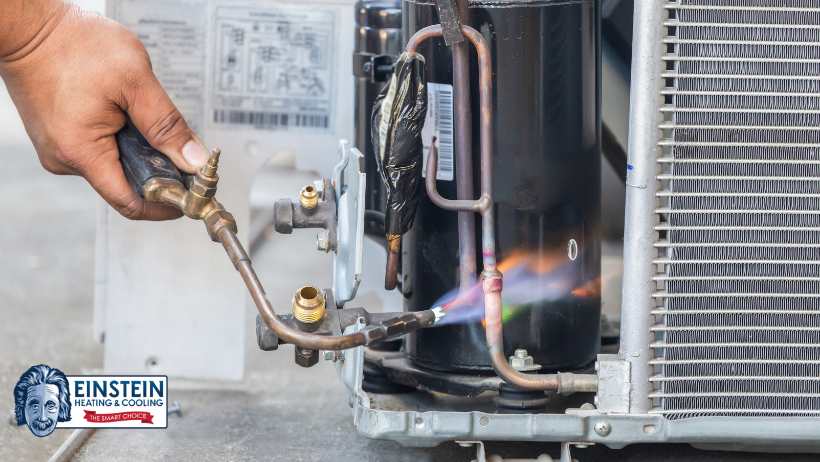
10. Constant Cycling
If your furnace runs continuously without reaching the desired temperature, it can result in discomfort and high energy bills. Common causes of constant cycling include:
- Dirty Air Filter: A clogged filter can restrict airflow, causing the furnace to run continuously. Regular filter maintenance is essential.
- Thermostat Issues: A malfunctioning thermostat may not accurately gauge the temperature, leading to constant cycling. Consider replacing or calibrating the thermostat.
- Blower Motor Problems: A faulty blower motor can prevent the furnace from distributing heat efficiently. Repairs or replacements may be necessary.
- Overheating: Overheating due to a malfunctioning limit switch can also cause constant cycling. A professional should inspect and address this issue.
11. Water Leaks Around the Furnace
The presence of water around your furnace is an alarming sign of potential trouble. Water leaks can have various causes, and each requires immediate attention.
- Condensate Line Blockage: Water leaks near your furnace can often be attributed to a blocked condensate line. When this line becomes clogged with debris or algae growth, it can cause water to back up and leak around the furnace.
- Cracked Heat Exchanger: The heat exchanger is responsible for transferring heat into your home’s air. When it develops cracks or holes, it can allow water to escape and accumulate around the furnace. In addition to water leaks, a cracked heat exchanger can introduce carbon monoxide into your living space, which poses a grave health risk.
12. DIY Limitations
While some minor furnace issues can be tackled by homeowners, it’s essential to recognize your limitations. Attempting complex repairs without the necessary expertise can lead to further damage, safety risks, and potential voiding of warranties. If you’re uncertain about your ability to fix the problem or if the issue involves any aspect of safety or gas-related components, searching up furnace repair near me may be the best thing you can do next. It’s best to call a professional. By attempting DIY repairs beyond your skill level, you may worsen the problem and incur higher costs in the long run. Hiring a qualified technician ensures that repairs are conducted safely, effectively, and in compliance with local codes and regulations.
Our skilled furnace repair team at Einstein Heating and Cooling knows what to do when these common problems show up. We will delve into the intricate details of what our technicians look at when assessing your furnace for repair, especially during the cold seasons in Bend. Understanding these aspects can help you better comprehend the process, anticipate potential problems, and take preventive measures to extend the life of your heating system.
Steps to Assess The Extent of Furnace Repair
1. Thermostat Calibration
The first step in our assessment process is checking the thermostat. The thermostat acts as the brain of your furnace, controlling when it turns on and off to maintain the desired temperature. Incorrect thermostat settings or calibration can result in irregular heating cycles and discomfort in your home. Our technicians will ensure that the thermostat is calibrated correctly, and the temperature readings are accurate, allowing your furnace to operate efficiently.
2. Air Filters
Dirty or clogged air filters can be a major hindrance to your furnace’s performance. If the filters are not regularly cleaned or replaced, it can lead to restricted airflow, causing your furnace to work harder and consume more energy. Our experts inspect and clean or replace the air filters to ensure proper airflow and optimal efficiency.
3. Electrical Connections
Faulty electrical connections can be a major safety hazard and cause your furnace to malfunction. We check all electrical connections, including wires, relays, and switches, to ensure they are secure and functioning correctly. Loose or damaged electrical connections can lead to short-circuits, electrical fires, or complete furnace failure.
4. Pilot Light and Ignition System
For gas furnaces, a properly functioning pilot light or ignition system is crucial. Our technicians examine these components to ensure they are lighting the burners effectively and consistently. If the pilot light is not functioning correctly, it can result in a lack of heat production and may even pose safety risks. Make sure to contact professional furnace repair.
5. Burners and Heat Exchanger
The burners are where the actual combustion process takes place. Over time, they can become clogged with dirt and debris, affecting the efficiency of your furnace. We inspect the burners for cleanliness and proper ignition, and we also examine the heat exchanger for any signs of cracks or damage. A damaged heat exchanger can release harmful gas like carbon monoxide into your home, which is a severe health risk.
6. Blower Motor and Fan
The blower motor and fan are responsible for distributing heated air throughout your home. We assess these components to ensure they are functioning correctly. A malfunctioning blower can result in inadequate heat distribution, leading to cold spots in your home.
7. Ductwork
The condition of your ductwork is often overlooked but plays a significant role in your furnace’s efficiency. Leaky or poorly insulated ducts can lead to heat loss and an increased workload for your furnace. Our technicians inspect the ductwork for leaks, proper insulation, and blockages to ensure that heated air is efficiently delivered to all areas of your home.
8. Safety Controls
Safety is a paramount concern when it comes to searching for “furnace repair near me.” We examine the safety controls, such as limit switches and pressure switches, to make sure they are functioning correctly. These controls are essential for preventing overheating and other potentially dangerous situations.
9. Gas Line and Venting
In the case of gas furnaces, our technicians pay special attention to the gas line and venting. We check for gas leaks and ensure that the venting system is properly expelling combustion gas outdoors. Any issues with these components can pose significant safety risks and must be addressed promptly.
10. Carbon Monoxide Detection
Carbon monoxide is a colorless, odorless gas that can be produced by malfunctioning furnaces. Our technicians use specialized equipment to detect the presence of carbon monoxide in your home. Safety is our top priority, and we take every measure to ensure your family is protected from this silent threat.
11. Insulation and Sealing
Proper insulation and sealing are essential to keep your home warm during the winter. We inspect your home’s insulation and look for any gaps or leaks that might be letting cold air in or warm air out. Addressing these issues can lead to energy savings and improved comfort.
12. Age and Overall Condition
The age and overall condition of your furnace are also vital factors in our assessment. Older furnaces tend to be less efficient and more prone to breakdowns. Our technicians can provide heating system recommendations based on the age and condition of your furnace, helping you make informed decisions about whether to repair or replace your heating system.
13. System Efficiency
Furnace efficiency is a key consideration in our assessment. We analyze your furnace’s energy consumption and performance to identify areas where improvements can be made. Upgrading to a more energy-efficient furnace can result in long-term cost savings and a reduced environmental impact.
14. Maintenance History
Your furnace’s maintenance history provides valuable insights into its current condition. Regular maintenance can extend the life of your heating system and prevent potential issues. We review your furnace’s service history to ensure that all necessary maintenance has been performed.
15. Customer Input
Einstein Heating and Cooling value your input as the homeowner. If you’ve noticed any specific issues, strange sounds, or irregularities in your heating system, be sure to communicate them to our technicians as we listen attentively to your furnace repair concerns. Your observations can help us pinpoint problems more efficiently.
In conclusion
Knowing when to call a professional for furnace repair in Bend is essential to maintain a safe, comfortable, and energy-efficient home. A thorough assessment of your furnace is crucial for ensuring its proper operation and efficiency. The experts at Einstein Heating and Cooling take a comprehensive approach to all types of furnace repair services, covering everything from the thermostat to the age and overall condition of the system. Our commitment to safety and efficiency means that your family’s comfort and well-being are our top priorities.
